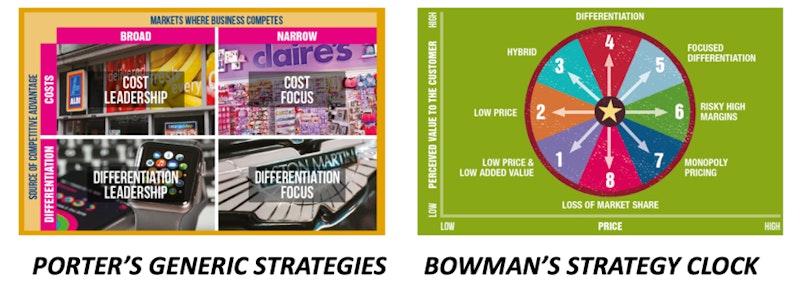Study Notes
Influences on the Choice of Positioning Strategy
- Level:
- A-Level, IB, BTEC National
- Board:
- AQA, Edexcel, OCR, IB, Eduqas, WJEC
Last updated 30 Jul 2019
What factors impact the choice of strategic positioning made by a business?
There are a variety of models that can be used by management to help them identify the strategic positioning options available. Two are mentioned below (Edexcel students - of the two you only need to know about Porter's Generic Strategies)

So what influences the choice of positioning? Here are some of the key factors a business must consider.
COMPETITORS
How strong are the competitors a business faces in its chosen strategic position? What advantages, if any, do those competitors face?
A business considering positioning itself using a cost leadership strategy (Porter) will want to assess whether it is capable of achieving the same level of efficiency and productivity as key competitors who also adopt a cost leadership strategy. Can the business access the same economies of scale as competitors?
Similarly, a strategy of differentiation may be attractive, but are existing competitors already exploiting the market opportunities for a differentiated product or service? What are their market shares of the market segments a business might want to target?
CORE COMPETENCIES
A honest view about the ability of the business to compete is essential. Does the business has a unique selling point that might enable it to sustain a strategy of differentiation?
If innovation is key to positioning, does the business have the appropriate resources, organisational culture and reward systems to create a suitable flow of innovation?
EXTERNAL ENVIRONMENT
Careful and regular scanning of changes in the external environment is key to effective strategic positioning. For example, changes in the political and/or regulatory environment can create opportunities as well as pose threats to the existing positions of businesses in a market.
Similarly, changes in the economic environment can challenge existing positions. For example, a significant economic downturn might increase the attractiveness of businesses that are positioned as "low cost" operators if demand for such products and services increases at the expense of higher-priced and higher-cost alternatives.
You might also like

Revealed- Jeff Bezos -The man behind Amazon
19th March 2015

The Problems at McDonald's - From the Inside
17th September 2015
Boston Matrix Revision Quiz
Quizzes & Activities
Motives for Takeovers and Mergers
Teaching PowerPoints
The Experience Curve
Study Notes
The 48 Laws of Power
29th January 2017

Mock Chocs - Poundland takes on shrinkflation
30th July 2017
Product Differentiation
Topic Videos